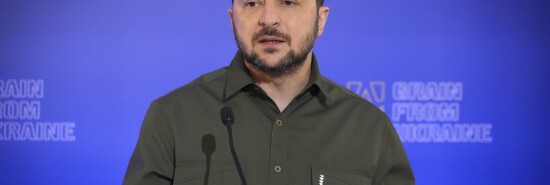
Ukraine’s generals are showing more realism than their civilian masters
Daniel DePetris
Video Embed
Given that Ukraine’s performance in its war with Russia has exceeded everybody’s expectations, one would assume its military leadership would be feeling upbeat. The Russian military, which started President Vladimir Putin’s “special military operation” in February with the expectation it would be over in a matter of weeks, has been rendered, if not a “paper tiger,” certainly not a predatory cat.
Yet during interviews in this week’s Economist, two of Ukraine’s most senior generals almost sounded bleak. Sure, there was a fair share of triumphalism about the Russian army’s inability to take Kyiv early in the war and its tendency to treat newly drafted recruits as cannon fodder. But Gen. Valery Zaluzhny, Ukraine’s top military officer, and Gen. Oleksandr Syrsky, the chief of Ukraine’s ground forces, were measured in their comments about the current state of the conflict, where it may be going, and Russia’s capacity to turn it around.
RUSSIA LAUNCHES A NEW MASSIVE WAVE OF STRIKES AGAINST UKRAINE
Zaluzhny, the most popular man in Ukraine outside of the president, Volodymyr Zelensky, was open and honest about the problems afflicting the Ukrainian military, principally the difficulty of squaring their munitions supply with the high usage rate in the field. Kyiv is entirely dependent on foreign powers for financial support and resupply. As heroically as Ukrainian troops have been fighting over the past nine months, their gains wouldn’t have been possible if the Biden administration hadn’t committed close to $20 billion in military aid to Kyiv. Syrsky was candid as well: “The Russians aren’t idiots. They aren’t weak. Anyone who underestimates [them] is headed for defeat.”
One gets the distinct impression that both military men, while pleased with how the Ukrainian army has held up, are far more level-headed about the war’s costs than their civilian masters back in Kyiv. This is less an indictment of Zelensky and his senior aides and more a reflection of their unique positions: closer to the ground, cognizant of the ins and outs of every battlefront, and fully immersed in the details and technicalities of the Ukrainian military’s ammunition stocks, readiness, and manpower.
Zaluzhny and Syrsky are also aware of the capacity of the enemy. That enemy has proven to be highly disorganized, riddled with poor assumptions, and prone to making catastrophic mistakes. But it’s an enemy that still controls roughly 20% of Ukrainian territory, possesses huge firepower, is fortifying its defensive positions, and is using the winter to hold the line (with the exception of an offensive in Bakhmut) and bring fresh recruits into the fight.
Just as vital as the materiel factor, the enemy has no red lines about what or who is on the target list. Gen. Sergey Surovikin, the man who helped destroy Aleppo with indiscriminate air strikes on residential neighborhoods, has spent the last two months taking aim at the very installations Ukrainians depend on daily. Power stations, electricity plants, and other public infrastructure are targeted mercilessly, so much so that millions of Ukrainians are forced to endure a lack of heat and electricity. The strategy isn’t moving the front lines to Russia’s advantage, yet it’s having a terrible impact on Ukraine over the long term, turning the country into a basket case economically. The Ukrainian economy has contracted by a third this year, 18 million Ukrainians need humanitarian aid, and the unemployment rate is about 30%. The Russian strategy is to make Ukraine uninhabitable, or uninhabitable enough that the politicians in Kyiv rethink their win-at-all-costs mentality.
Will it work? Only time will tell.
Right now, the Russian strikes are having the inverse effect: The more Russian missiles lay waste to Ukrainian cities and towns, the more resistant the Ukrainian population is to settling for anything other than a full, unequivocal military victory. The words “peace talks” or “diplomacy” barely cross Zelensky’s lips. When Zelensky does talk of peace, it’s prefaced on a series of preconditions, such as a total withdrawal of Russian troops from every square inch of Ukrainian territory, including Crimea, that basically equate to unconditional surrender terms.
War, however, is an unpredictable phenomenon. What’s unlikely today may be possible tomorrow. Zaluzhny and Syrsky understand this quite well, even if others don’t.
CLICK HERE TO READ MORE FROM THE WASHINGTON EXAMINER
Daniel DePetris (@DanDePetris) is a contributor to the Washington Examiner’s Beltway Confidential blog. His opinions are his own.
